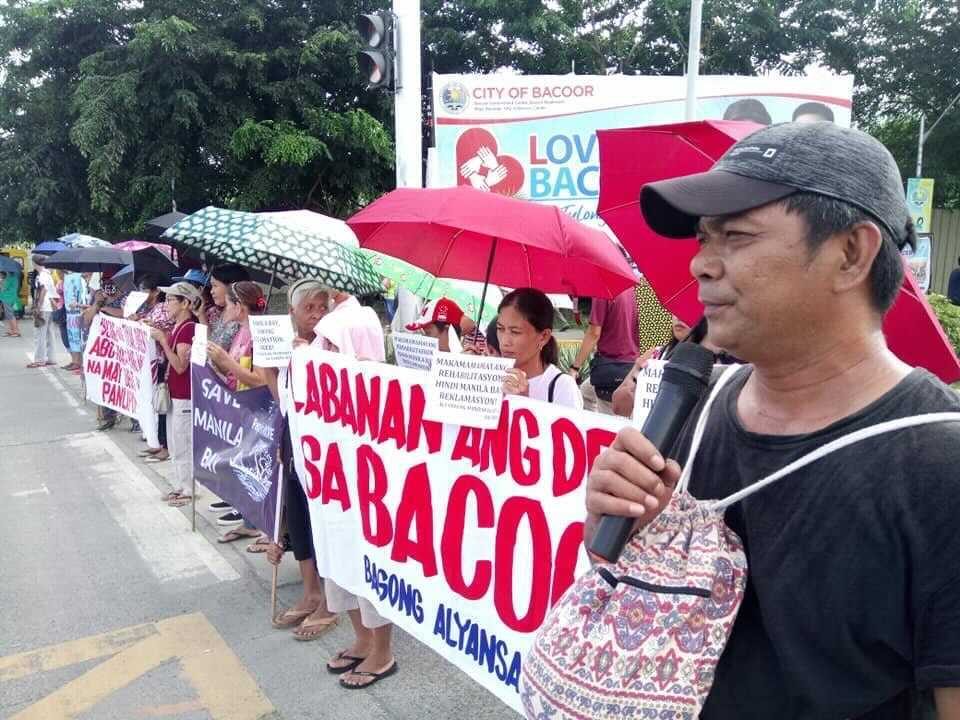SUMMARY
This is AI generated summarization, which may have errors. For context, always refer to the full article.

Mass organizer Emmanuel “Manny” Asuncion, among the 9 people killed in a bloody crackdown in Calabarzon, was shot dead by policemen in an office in Dasmariñas, Cavite, when the search warrant issued was for his home in Rosario, another town in the province.
The search warrant, issued by Manila First Vice Executive Judge Jose Lorenzo dela Rosa, covered Asuncion and his home in Rosario, Cavite, where he supposedly kept a .45 caliber pistol and ammunitions. Police were able to seize one gun, ammunitions and magazines, from the Rosario address, according to a receipt of confiscated items.
Asuncion was, however, killed not in Rosario, but in the office of the Workers’ Assistance Center (WAC) in Dasmariñas, roughly an hour away by car from Rosario.
Human rights group Karapatan said in a statement on Monday, March 8, that the Rosario home was searched at around 5:40 am Sunday, March 7.
Citing witnesses who heard gunshots and saw Asuncion’s body being brought out of the building, Karapatan said he was killed in Dasmariñas between 5 and 6 am.
In a phone interview with Rappler, Calabarzon police spokesperson Lieutenant Colonel Chitadel Gaoiran said the “only possibility” she can see from the incident is that there was a “chase.”
“Baka ito, positive nakita, pero nagka-information na ‘andun (Dasmariñas) siya nahuli (It might be that the illegal items were seized and then information emerged that he was in Dasmariñas),” Gaoiran said.
“That’s a blatant lie,” said Elmer Labog, chairperson of labor group Kilusang Mayo Uno (KMU), saying Asuncion and his wife Liezel were already at the WAC office in Dasmariñas on Saturday night, March 6.
According to Karapatan, Asuncion “tried to negotiate” with the police who were at the doors of the Dasmariñas office. He said he would cooperate if they could present a search warrant.
“None was served, however, and Asuncion was dragged away from his wife before gunshots were heard – 6 bullets, 3 in the front, and 3 in the back, were recovered from his body,” said Karapatan.
Gaoiran said operatives are still preparing their reports as of posting, even after a day had passed since the operations.
Legal implications
Police can search property that’s the subject of a warrant even without the person named in the warrant, as long as there is a lawful occupant, or “at least two witnesses of sufficient age and discretion residing in the same locality,” according to Rule 126 of the Revised Rules on Criminal Procedure.
The question is, did the police have legal basis to pursue or chase Asuncion, (if there was indeed a chase), if the activist was not in his home.
The rules for warrantless arrest provide that law enforcement agents must catch the person in the act of committing a crime, in this case, possessing the firearms.
“The issuance of the search warrant pertains to his keeping the firearms in that place, not in his person. So there is no cause to pursue him,” said Josa Deinla of the National Union of Peoples’ Lawyers (NUPL).
Krissy Conti of the Public Interest Law Center said she anticipates the police will justify the chase by saying that though Asuncion might not have been in possession of the firearms, he was in “control” of them.
“Control is, you are the one who might have the lock to the room, might be the owner of the house, that’s the possible justification, but then of course that would also fail legally, because they have to show that this person was the only one who could possibly access the firearms,” said Conti.
The lawyers and progressive groups again called on judges to be more prudent and probing when issuing search warrants. The search warrants obtained by the human rights groups showed it was Dela Rosa and Manila RTC Branch 174 Judge Jason Zapanta who issued them. This resulted in the bloody crackdown in Calabarzon.
These so-called warrant factories that resulted before in arrests of activists, and now in killings, have been brought to the attention of the Supreme Court through a petition filed last year.
There is no known action on that petition yet. – with reports from Rambo Talabong/Rappler.com
Add a comment
How does this make you feel?










There are no comments yet. Add your comment to start the conversation.